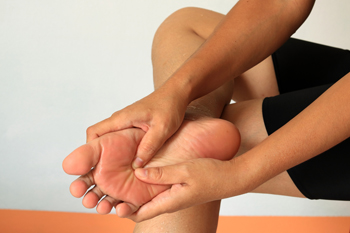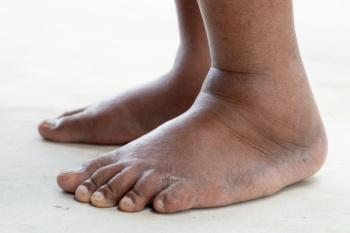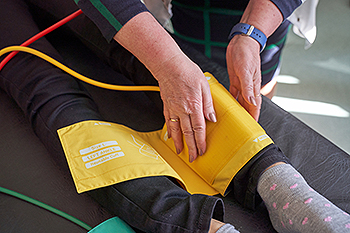
Peripheral neuropathy presents a diverse range of conditions that affect peripheral nerves in the lower extremities, resulting in symptoms like numbness and weakness. Causes can include diabetes, infections, injuries, or toxin exposure, with certain individuals at a higher risk due to genetics or lifestyle factors. Diagnosis involves a thorough assessment of symptoms and medical history, often supplemented by nerve conduction studies or imaging tests. Treatment focuses on symptom management and addressing underlying causes, taking certain medications, and making lifestyle adjustments, However, outcomes vary depending on the specific condition and its severity. If you suffer from peripheral neuropathy, it is suggested that you consult a podiatrist for an accurate diagnosis and personalized treatment plan.
Neuropathy
Neuropathy can be a potentially serious condition, especially if it is left undiagnosed. If you have any concerns that you may be experiencing nerve loss in your feet, consult with Dr. Steven Shlonsky from Louisville, Kentucky. Dr. Shlonsky will assess your condition and provide you with quality foot and ankle treatment for neuropathy.
What Is Neuropathy?
Neuropathy is a condition that leads to damage to the nerves in the body. Peripheral neuropathy, or neuropathy that affects your peripheral nervous system, usually occurs in the feet. Neuropathy can be triggered by a number of different causes. Such causes include diabetes, infections, cancers, disorders, and toxic substances.
Symptoms of Neuropathy Include:
- Numbness
- Sensation loss
- Prickling and tingling sensations
- Throbbing, freezing, burning pains
- Muscle weakness
Those with diabetes are at serious risk due to being unable to feel an ulcer on their feet. Diabetics usually also suffer from poor blood circulation. This can lead to the wound not healing, infections occurring, and the limb may have to be amputated.
Treatment
To treat neuropathy in the foot, podiatrists will first diagnose the cause of the neuropathy. Figuring out the underlying cause of the neuropathy will allow the podiatrist to prescribe the best treatment, whether it be caused by diabetes, toxic substance exposure, infection, etc. If the nerve has not died, then it’s possible that sensation may be able to return to the foot.
Pain medication may be issued for pain. Electrical nerve stimulation can be used to stimulate nerves. If the neuropathy is caused from pressure on the nerves, then surgery may be necessary.
If you have any questions, please feel free to contact our office located in Louisville, KY . We offer the newest diagnostic and treatment technologies for all your foot care needs.

Swelling of the feet, medically known as peripheral edema, can result from various causes ranging from less severe to potentially severe conditions. Mild reasons may include prolonged standing or sitting, dietary factors like excessive salt intake, or wearing ill-fitting shoes. However, severe underlying conditions such as heart failure, kidney disease, venous insufficiency, or deep vein thrombosis can also lead to foot swelling. Regardless of the cause, persistent or sudden onset swelling warrants attention. Suppose your feet are swollen and you are not sure of the cause. In that case, it is suggested that you schedule an appointment with a podiatrist who can perform a comprehensive evaluation, which may involve a medical history review, physical examination, and diagnostic tests, to identify the underlying cause and develop a tailored treatment plan.
Swollen feet can be a sign of an underlying condition. If you have any concerns, contact Dr. Steven Shlonsky of Louisville, Kentucky. Dr. Shlonsky can provide the care you need to keep you pain-free and on your feet.
Swollen feet are a common ailment among pregnant women and people who stand or sit for extended periods. Aging may increase the possibility of swollen feet and patients who are obese often notice when their feet are swelling too. There may be medical reasons why swollen feet occur:
- Phlebitis - A condition that causes the veins to become inflamed and can also cause leg pain.
- Liver disease - This may lead to low blood levels of albumin which is a protein. This can cause fluid in the blood to pass into the tissues and several areas of the body can become swollen.
- Heart failure - When the heart doesn’t pump properly the blood that is normally pumped back to the heart can pool in the veins of the legs causing swollen feet.
- Kidney disease - One of the main functions of the kidneys is releasing excess fluid in the body. This type of condition can make it difficult for the kidneys to function properly, and as a result the feet may become swollen.
- Deep-vein thrombosis (DVT)- This is a serious condition where blood clots form in the veins of the legs. They can block the return of blood from the legs to the heart which may cause the feet to swell. It is important to be treated by a podiatrist if this condition is present.
Swollen feet can also be caused by bone and tendon conditions, including fractures, arthritis, and tendinitis. Additionally, there may be skin and toenail conditions and an infection may cause the feet to swell. Patients who take medicine to treat high blood pressure may be prone to getting swollen feet.
Many patients elevate their feet to help relieve the swelling and this is generally a temporary remedy. When a podiatrist is consulted the reason behind the swelling can be uncovered and subsequently treated.
If you have any questions please feel free to contact our office located in Louisville, KY . We offer the newest diagnostic tools and technology to treat your foot and ankle needs.
 Peripheral artery disease, or PAD, is a condition where the arteries that supply blood to the legs and feet become narrowed or blocked due to plaque buildup. This decreases blood flow to the lower extremities. Symptoms of PAD can vary but often include leg pain or cramping while walking or climbing stairs, which typically eases with rest. Some people may also experience numbness, weakness, or a cold sensation in their lower legs or feet. Changes in the color of the skin or slower growth of the nails may also occur. In more severe cases, PAD can lead to wounds or ulcers on the feet or legs that heal poorly or not at all. Getting diagnosed early is important because PAD can be a sign of more widespread arterial disease, which could increase the risk of heart attack or stroke. Early treatment can help manage symptoms, improve mobility, and reduce the risk of more serious complications. It is suggested that you consult a podiatrist, or foot doctor, for help if you are experiencing any symptoms that sound like PAD.
Peripheral artery disease, or PAD, is a condition where the arteries that supply blood to the legs and feet become narrowed or blocked due to plaque buildup. This decreases blood flow to the lower extremities. Symptoms of PAD can vary but often include leg pain or cramping while walking or climbing stairs, which typically eases with rest. Some people may also experience numbness, weakness, or a cold sensation in their lower legs or feet. Changes in the color of the skin or slower growth of the nails may also occur. In more severe cases, PAD can lead to wounds or ulcers on the feet or legs that heal poorly or not at all. Getting diagnosed early is important because PAD can be a sign of more widespread arterial disease, which could increase the risk of heart attack or stroke. Early treatment can help manage symptoms, improve mobility, and reduce the risk of more serious complications. It is suggested that you consult a podiatrist, or foot doctor, for help if you are experiencing any symptoms that sound like PAD.
Peripheral artery disease can pose a serious risk to your health. It can increase the risk of stroke and heart attack. If you have symptoms of peripheral artery disease, consult with Dr. Steven Shlonsky from Louisville, Kentucky. Dr. Shlonsky will assess your condition and provide you with quality foot and ankle treatment.
Peripheral artery disease (PAD) is when arteries are constricted due to plaque (fatty deposits) build-up. This results in less blood flow to the legs and other extremities. The main cause of PAD is atherosclerosis, in which plaque builds up in the arteries.
Symptoms
Symptoms of PAD include:
- Claudication (leg pain from walking)
- Numbness in legs
- Decrease in growth of leg hair and toenails
- Paleness of the skin
- Erectile dysfunction
- Sores and wounds on legs and feet that won’t heal
- Coldness in one leg
It is important to note that a majority of individuals never show any symptoms of PAD.
Diagnosis
While PAD occurs in the legs and arteries, Podiatrists can diagnose PAD. Podiatrists utilize a test called an ankle-brachial index (ABI). An ABI test compares blood pressure in your arm to you ankle to see if any abnormality occurs. Ultrasound and imaging devices may also be used.
Treatment
Fortunately, lifestyle changes such as maintaining a healthy diet, exercising, managing cholesterol and blood sugar levels, and quitting smoking, can all treat PAD. Medications that prevent clots from occurring can be prescribed. Finally, in some cases, surgery may be recommended.
If you have any questions, please feel free to contact our office located in Louisville, KY . We offer the newest diagnostic and treatment technologies for all your foot care needs.








